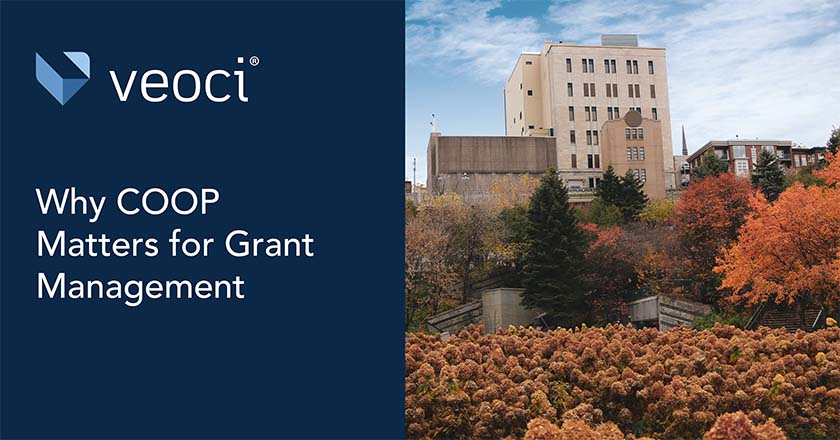Preparedness shows why it’s paramount for governments with every incident that bubbles up. Whether it’s through prolonged troubles like the Covid-19 pandemic or sudden weather incidents, a solid plan helps governments of all sizes put forward a thorough response, expedite recovery, and ensure essential functions and services for the people that rely on the government above them.
The track record of this principle is why legislatures have pushed the ideas in the lawbooks and started to tie funds to preparedness. With these new dynamics emerging for governments, it’s a good time to take stock of the landscape and build a game plan for preparedness that not only works in a response, but in daily operations and administration as well.
The Role of COOP in Government and Grant Management
When an incident strikes, preparedness can mean the difference between timely management and recovery and a crisis that is difficult to bounce back from. Officials and legislatures are well aware of this challenge; over the past decade both parties have had to respond to public health crises, weather events, and more to make sure their constituents stayed safe. These incidents and many from the past have pushed the government at all levels to enhance preparedness by baking emergency management best practices into operations. Working preparedness into operations for many local, state, and county municipalities has included codifying certain measures in legislation.
Practitioners and legislatures have identified continuity of operations plans (COOP) as one of the measures governmental entities at all levels can implement to bolster their abilities to respond to disasters and keep their residents safe. COOP is essential to ensuring that governments at any level are able to continue to function during an incident or response and why the proper maintenance of COOP plans is so crucial for governments.
COOP, more interestingly, is probably one of the best preparedness operations a government can regularly perform. The practice already has demonstrated value during disasters and other disruptive events; regular maintenance of COOP plans greatly improves responses and response outcomes. But the benefits of the practice are bigger from an administrative perspective.
Proper COOP administration, management, and maintenance all help secure additional and essential funding for governments. and especially so for the smaller bodies. Without this practice, counties and other bodies can lose funding, incur fines, and ultimately negatively impact the lives and safety of employees and constituents.
A well organized COOP program is crucial for maintaining functions through disasters and ensuring funds at every level of government. With that in mind, what can an organization do to ensure that its COOP program is being properly maintained and securing the funds and grants it needs to?
Best Practices for Maintaining COOP Programs
1. Build out your plan maintenance cycle at every level
â€Having a comprehensive plan allows organizations to understand the different dependencies and eventualities of their emergency response and how to best comply with government grant regulations. It is also an opportunity to incorporate oversights from past incidents into plans, allowing for a more comprehensive operation.
2. Keep the right people in the loop
Continuity plans are only as good as the people executing them. It is crucial to know everyone’s responsibilities during an incident, have back up contacts, and make sure the right people are updating hazard mitigation and other types of plans. Tools now offer specialized services that can both train heads of departments on delegating tasks to the right people and send out automatic notifications to plan owners, guaranteeing everything remains up to date.
3. Practice, revise, and improveâ€
Drills and tabletop exercises stress test COOP plans without invoking the risks that surround real disasters. Running drills and participating in National Level Exercises (NLEs) are great ways for understanding how your team responds and how it can improve its operations. Digital tools can be a huge help in making exercises a regular aspect of operations. For example, Veoci lets EOCs run full scale incident and continuity responses as a drill and create “what if” modeling, presenting teams with different eventualities, capturing the operational landscape at the time of an incident, and showcasing how each role truly functions. This also shows where to allocate grant funds in the case of an event, making reporting more accurate.
4. Learn from your mistakes
Incident response can be imperfect. Even COOP plans are no stranger to the adage about a plan surviving first contact with the enemy; something is bound to slip by seemingly watertight plans. The key is to acknowledge these oversights and learn from them. After-action reporting and data from past incidents are some of the best ways to determine best practices for the future.
5. Keep information consolidated and accessible.
â€Documentation of past incidents is extremely important for continuing funding. With so much going on during an emergency, it can be easy for forms, receipts, and more to get lost in the shuffle. Having a central location for communication, forms, and the documentation of a response makes reporting to federal agencies the reimbursement process much quicker and simpler. Veoci, as an example again, assists teams with communications during incidents, consolidating response communication, and having access to all relevant forms—including situation reports, ICS forms, incident reports and more—for reporting to agencies and receiving funding.
Investment and Returns
Creating a fully fledged COOP management system can seem intimidating. Doing so requires a great deal of coordination to make sure the right people are involved, every system is compliant with regulations, and the program covers all needs and dependencies that keep daily processes going during an incident. And the effort pays off. Well-managed COOP plans make applying for and receiving grants with stringent COOP requirements a much less troublesome process and offer some peace of mind for the personnel on both the emergency management and administrative sides of government.








